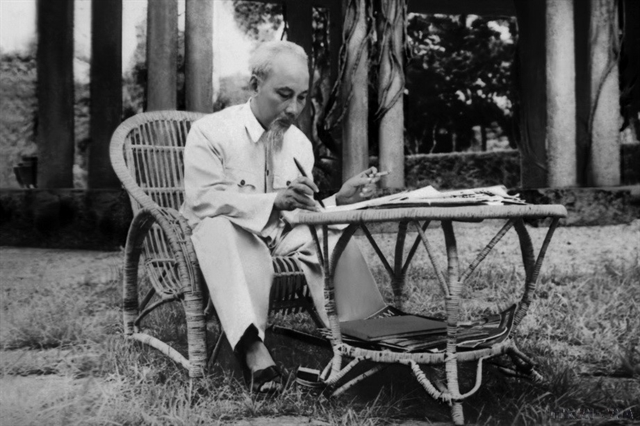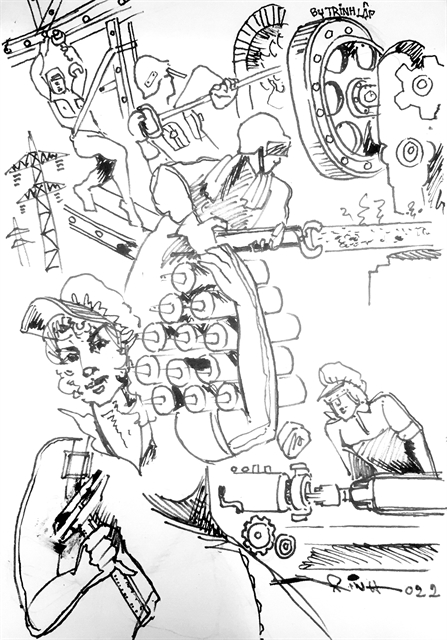 Talk Around Town
Talk Around Town

The scheduled minimum wage rise for workers has been delayed for two years due to the pandemic.

|
| Illustration by Trịnh Lập |
by Nguyễn Mỹ Hà
The scheduled minimum wage rise for workers has been delayed for two years due to the pandemic.
Times have been tough since the last time minimum wage was suggested by the National Wage and Salary Committee. Workers have suffered not only from being laid off due to broken production chains but faced more arduous living conditions as rents increased and inflation rose.
"An increase in the minimum wage has been the righteously and lawfully demanded by the majority of our workers after being delayed for two years," said Ngọ Duy Hiểu, vice president of the Việt Nam General Confederation of Labour, the country's trade union organisations.
According to studies by the Workers' and Trade Union Academy, after factoring in price rises, productivity, labour demand, and businesses' ability to pay, the regional minimum wage must be raised at least by 10 per cent to meet minimum living standards.
Việt Nam's current minimum wage for a worker per month in Hồ Chí Minh City, the highest in all four regions, remains at VNĐ4,220,000 per month, which barely meets 95 per cent of the minimum living standards, and only 59 per cent of adequate living costs, according to the Research Centre for Employment Relations. The last minimum wage was announced in early 2020 and is supposed to be reconsidered annually.
"The minimum wage is not just low, it's too low," is the refrain of manual workers and white-collar workers.
College graduates start their jobs at a salary of VNĐ 4 million; some college adjuncts say they have a master's degree with a wage of just VNĐ5.3 million after eight years of experience.
The worker's minimum wage is even higher than the basic starting wage applied to government employees, who have at least a bachelor's degree, at VNĐ3,480,000 per month.
But this wage barely covers a worker's expenses, including rent, transport, food and clothing. You're not allowed to get sick or invited to any weddings or funerals and certainly never able to put aside any money for saving.
Experts say the minimum wage can be increased, but inflation also needs to be kept under control, otherwise, wage increase pushes other prices upwards.
The concept of "minimum living conditions" was first included in the Labour Code in 2012, effective since May 1, 2013. Its purpose was to ensure basic needs for the workers who perform the most straightforward work.
Ten years later, the minimum wage still doesn't meet the minimum living conditions and is too low for adequate living conditions.
The Workers and Trade Union Institute announced that in 2021, the gap between the minimum wage and minimum living conditions rose by more than 10 per cent.
The Ministry of Labour, War Invalids and Social Affairs are about to launch a survey on workers' labour, wage and living levels in 18 cities and provinces in the country to work out possible changes in the regional minimum wage in 2023.
Hoàng Quang Phòng, vice president of the Viêt Nam Chamber of Commerce and Industry, says due to the pandemic and realistic conditions of the enterprises, an increase in the minimum wage is not currently feasible.
Meetings between union and business leaders have been complex, leading to disputes and union leaders leaving the discussion table protesting business leaders' decisions not to raise the minimum wage.
In his speech on May Day 2021, President Nguyễn Xuân Phúc told the country's working class: "We today have more than 16 million workers, annually producing 60 per cent of gross domestic product, and contributing 70 per cent to the state budget. But the lives of many are still tough."
He also cited workers' issues of income, employment, accommodation, working environment, recreational areas, kindergartens, schools, working conditions, personal safety, and labour security.
"The ongoing pandemic has been making these problems even worse," he told the country's workforce.
These disputes even go down to food, with the National Institute for Nutrition saying a worker's daily calorie intake must be 2,300kcal, while business leaders insist on keeping it as low as 2,000kcal.
It is vital that workers can live and work and provide for their families with food, education, healthcare and some recreational activities. An independent government body should be set up to regulate and ensure this.
Labour experts suggest that union leaders outline vital needs so that the Government can set conditional living standards and business managers recruit accordingly.
The confrontation between unions and businesses may stagnate without any improvements. We need action on this to support labourers as soon as possible. A country is built on the hard graft of its workers, and they should not be left to struggle. VNS




